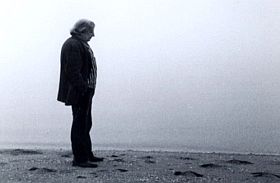This is the press release from the festival:
The 56th International Leipzig Festival for Documentary and Animated Film, DOK Leipzig, culminated on Saturday night with a festive closing ceremony. Seventeen prizes totalling €69,500 were presented at the awards ceremony in the Schauspiel Leipzig. It was already apparent on the penultimate day of the festival that with 1,705 accreditations and huge crowds in the cinemas, DOK Leipzig was set to reach new records for the number of industry guests and visitors.
The winners: “Stop the Pounding Heart” (photo) (USA, Belgium, Italy) by Roberto Minervini was honoured with the prestigious Golden Dove in the International Competition Documentary Film. The award comes with €10,000 and is sponsored by MITTELDEUTSCHER RUNDFUNK. The top prize was presented by MDR Director Karola Wille for the first time.
The Golden Dove for Best Animated Film, which comes with a cash prize of €5,000, was given to the Slovenian entry “Boles” by Špela Čade. The Silver Dove in the Animated Film category, which comes with a €2,000 cash award, went to Academy Award-winner Chris Landreth from Canada for his film “Subconscious Password”.
The €10,000 Golden Dove in the German Competition Documentary Film went to Carlo Zoratti for his film “The Special Need”.
The Talent Dove of the Media Foundation of the Sparkasse Leipzig, the top prize in the Young Cinema Competition, went to Kaveh Bakhtiari for the Swiss-French production “L’Escale” (“Stop-Over”). The prize money of €10,000 is intended to serve as seed funding for the Iranian-born director’s next documentary project.
In the International Short Documentary Competition, the Indian entry “Distance” was honoured with a Golden Dove. Ekta Mittal and Yashaswini Raghunandan will receive a cash prize of €3,000 from TELEPOOL GmbH.
The first-ever Golden Dove for Best Animated Documentary went to Daniela De Felice for the French production “Casa”. The first-of-its-kind award for the animation-documentary hybrid form comes with €3,000.
The €8,000 Healthy Workplaces Film Award from the European Agency for Safety and Health at Work (EU-OSHA) was awarded to the Brazilian filmmaker Aly Muritiba for his film “A gente” (“C(us)todians”). The MDR Film Prize for an outstanding East European documentary film, with a cash award of €3,000, went to “Die Trasse” (“Pipeline”) by the Russian filmmaker Vitaly Mansky. The DEFA Sponsorship Award for an outstanding German documentary, which comes with a stipend of €4,000, was received by Yael Reuveny (Germany, Israel) for her film “Schnee von gestern” (“Farewell, Herr Schwarz”).
The Documentary Film Prize of the Goethe Institute, with a cash award of €2,000, went to Judith Keil and Antje Kruska for their film “Land in Sicht” (“Land in Sight”). The Prize of the Ecumenical Jury, which comes with a €2,000 cash award and is given by the VCH-Hotels Germany GmbH – a part of the Association of Christian Hoteliers – including the Michaelis Hotel in Leipzig, was given to Robert Kirchhoff (Slovakia) for “Kauza Cervanová” (“Normalization”).
The FIPRESCI Jury awarded its prize to Gang Zhao (China) for “A Folk Troupe”. For “Hilton! – Täällä ollaan elämä” (“Hilton! – Here For Life”), Virpi Suutari was honoured with the Prize of the Vereinte Dienstleistungsgewerkschaft ver.di, which comes with €2,500 in award money. The Prize of the Youth Jury of the Leipzig Film School was presented to Aneta Kopacz for her film “Joanna”. The mephisto 97.6 Audience Award was determined by public vote. It went to Robert Löbel for his animated film “Wind”.
The “Leipziger Ring” film award from the Stiftung Friedliche Revolution, with a cash prize of €5,000, was awarded on Friday in Leipzig’s St. Nicholas Church, which in autumn 1989 was the starting point for the large Monday Demonstrations. The award went to the iranian documentary filmmaker Nahid Persson Sarvestani, who lives in Norway, for her film “Min stulna revolution” (“My Stolen Revolution”). One of the protagonists of the film, Monireh Baradaran, accepted the award at the ceremony on behalf of the director.
It was already apparent on the penultimate day of the festival that the number of visitors last year (37,600) was easily surpassed and could reach the 40,000 mark. The number of accredited industry guests also reached an all-time high of 1,705 (1,526 last year).



